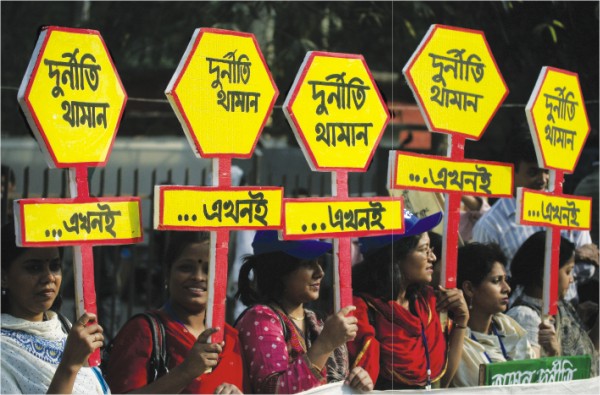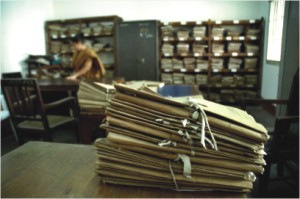
Inside
|
Of Corruption Most Chronic MAHFUZUR RAHMAN questions whether religion and morality "[ …] extortions by every man in a public employment, however low, by long custom have become so rooted among the inhabitants of this country, that their eradication, if at all possible, must be the work of the most indefatigable industry, and extreme severity."
THOSE who think that the much talked about corruption in Bangladesh is a very recent phenomenon will perhaps be shocked if told that these lines were written well over two hundred years ago. They were the words of Francis Buchanan, medical doctor, explorer and naturalist, working for the East India Company, who visited southeastern Bengal in early 1798. (Francis Buchanan in Southeast Bengal (1798), Willem van Schendel (ed.), The University Press Ltd. Dhaka. 1992.) Yet it is almost certainly true that the ubiquity of corruption has increased manifold since then, while the words used to describe the difficulty of its eradication are still as apt today as they were two hundred years ago. I do not believe, however, that the progression of corruption has followed a linear path. It probably formed a rugged plateau and remained in that state for a long period, before climbing gently over the not very distant past, and then rising steeply to Himalayan heights in the past few decades, with no sign of an impending descent. This would be a rather interesting sketch were it not so sinister. I do not claim to possess empirical data that researchers on the subject would love to have to construct such a scenario. But bear with me. I believe most people of my generation or older would not dispute too harshly if I assigned the plateau to the distant British Raj, the mildly rising phase of corruption to the late British and early Pakistani rule, and its huge acceleration to post- liberation Bangladesh. Anecdotal evidence, much of it coming from my elders, and my personal experience, would at least support the latter part of the story, beginning with the late British period. The colonising British, while imposing their rule on the subcontinent, also bestowed on it the concept of rule of law. They also created a bureaucracy to enforce it. That bureaucracy, justly reviled as it degenerated into a virtual synonym for inaction, was manned by a group of men known for the integrity of their character. 'Incorruptible' was perhaps too much of an adjective to apply to them. But most of the civil servants, many British, would perhaps closely fit that description. There were exceptions, but they seemed to prove the rule. Senior heads of administrative districts and departments and, particularly, the judiciary at practically all levels come to mind as functionaries largely untouched by corruption. It is also not difficult to imagine senior civil servants with a reputation of incorruptibility setting his stamp of honesty on the entire bureaucracy within his domain. Before such descriptions carry us away, it is wise to accept the existence of corruption, particularly at the lower levels of the administration. Buchanan, whom I quote above, acknowledges as much.In the mid-nineteen fifties, as a twenty-two year old junior official, I joined the provincial Directorate of Industries. Fresh from the university, I had my first glimpse of a bureaucracy at work. Rumour had it that the Directorate was one of the most corrupt in the bureaucracy, perhaps next to the office of the controller of imports and exports. Yet in my six years at the Directorate I found Perks did exist but on a relatively small scale, and were generally restricted to a few, but undeterminable, number of lesser officials and staff. Nevertheless, in an economic regime of severe import restrictions and scarcity, the incentive to manipulate import permits, the lifeblood of commerce and industry, was great. An import permit culture, a breeding ground for corruption, was already born. That, admittedly, was a small world. But I could look around way beyond it. And I could look back. There were a host of other areas where corruption, mainly in the form of extortion by petty officials, was deep-seated. There was soon a palpable increase in corrupt practices in these, as well as in new areas such as modern commerce and industry. And there were areas that remained practically corruption free.
Fast forward over the next half-century to the present. Mamata (her real name) is a teacher in a primary school of an upazila up in the north of the country. She has to commute a long distance to the school. She desperately needs a transfer to another school in the same upazila. She goes to the district education office. After several trips and numerous pleadings, she was told the transfer was 'doable.' She has to do something first. On her next day of appointment at the office, she sends her husband Nazrul (also a teacher) with ten thousand takas in his pocket. The head clerk, who incidentally is still called Bara Babu as in the British days, was out saying his zohr prayers. Nazrul waits in his office. Bara Babu, wearing a round cloth cap, walks in, takes off his cap, and takes his seat, the spiritual satisfaction of just having performed his prayer still glowing on his face. Nazrul discretely takes out the money from his pocket and meekly offers it to him. Bara Babu points to a low stool behind the clerk's table. Nazrul places the money on the stool as directed. In a few days Mamata gets her transfer. Her salary is around five thousand takas; she has just paid a bribe of ten thousand. Sometime later, her husband Nazrul, needed a transfer. The upazila education officer is a kind man. Nazrul offers to go to his residence to 'talk' about it. The officer readily agrees. It is the esha, or late evening, prayer time. The officer has gone to the mosque to pray. Nazrul waits. Prayer over, the officer comes home. They chat a while. Nazrul gives him a bundle of notes he was carrying. This time too the amount was ten thousand taka. The officer was happy. The transfer was quickly done, with a few other smaller sums being paid. Nazrul and Mamata had to have more than one transfer to suit their needs. They spent a total of some fifty thousand takas to effect the transfers. These are true stories. All over Bangladesh similar scenes are replicated perhaps in the thousands every day. The administration of education is now said to be one of the most corrupt in the country. I have heard it said umpteen times by people who are well informed. And yes, this is where a sea change has taken place since liberation of the country and this was an area that was corruption-free only four or five decades ago. And here is one more area where corruption has already turned chronic. Still on the matter of corruption in education, colleges and universities of today would be virtually unrecognisable in our days as students. There were then no 'fees' to offer to 'student' groups before admission was secured. There was no money to be paid to one group of students or the other before a bed could be had in a students' hall of residence at the university. Students fighting, with guns and machetes no less, to secure lucrative government contracts are scenes not visited in our worst nightmares: they now have become merely a fact of our social life. One could fill many pages with such sordid tales of corruption that has been plaguing society. But that would be repeating the well known. Still, questions such as this bear repetition: what makes someone offer a bribe of one hundred thousand takas to get a job of a peon or an orderly, in a government office where his monthly salary would be a mere two or three thousand takas? Surely, he is no fool; he expects to earn far more through 'other' means, enough to make his offer of the bribe worthwhile. This may look like an extreme example, and probably it is, but it is by no means uncommon. It is now a common practice for seekers of very low paid jobs such as a clerk's, to pay bribes equal to many times the salary the job carries. Often this is an act of desperation in a world of limited employment opportunities, but all too often the quest of lucre is the overriding motive. I have focused what might be called corruption among 'common' people -- no belittling intended ---the masses. This is not to ignore corruption in high places that, too, has soared and, if anything, deserves greater attention. But the family resemblance between the practice in high places and that in the low is very close. In both cases some people gain at the expense others, either directly or through depriving the state of revenue and thus harming it. In fact, excoriation of the helpless and the poor takes place primarily at (or through) the relatively low levels of the bureaucracy, by 'small' people. And the moral dimension of the practice is the same in both cases, as is the legal implication. Since the vast majority of the society consists of the 'small' people, corruption among them, ironically, reflects on the society as a whole. Much has been said about the legal aspect of corruption. Not much has been done about it. This is truly amazing, given the ubiquity and virtual openness of the practice. This is partly because of the helplessness of those who has to offer a bribe and his double jeopardy if he reports it. Or perhaps this is partly because the motive of bribe-giving now is balanced by the motive of bribe-taking in the future, so that the incentive of talking about it too loudly is absent. Far more amazing is, however, the moral dimension of bribery. Bribery is morally as much a sin as it is legally a crime. Yet if the legal aspect of corruption is half- submerged on the surface of consciousness of the society, the moral aspect of it lies way below. So deep indeed does it lie that its existence can be denied. The total absence of any discourse, private or public, suggests as much. Even if, while taking a bribe, the official taking it considers his action unlawful, apparently he does not consider it morally reprehensible. He would otherwise not accept it in the first place. Given the pandemic nature of extortion in society, one must therefore wonder what that implies for the moral fibre of the society. Our failure here must be seen as even greater than that on the legal plane. The puzzle is all the greater because the Muslim society in Bangladesh, the predominant section of the population, is becoming more pious in the strictly religious sense. There is no doubt that an average Bangladeshi Muslim practices his or her religion more often and with greater fervour than anytime in the past. Mosques fill to capacity during prayer times. The assembly of devotees spills out from mosques to the streets during Friday congregations. The number of people saying their five obligatory daily prayers has undoubtedly increased. Preaching by the Tablig Jamat has been remarkably successful in drawing many ordinary Muslims to orthodox Islam. The annual Biswa Ijtema on the outskirts of Dhaka now draws a crowd of over two million devotees, compared with a few hundred thousand not so long ago. How does one reconcile the proliferation of piety with the spread of corruption of the sort we have been talking about? In the two cases of perks I narrated above, both the functionaries were devout Muslims. I wish I had an answer. On the other hand, take a look at the remarkably corruption-free societies in the west, variously called secularist, irreligious, or even godless, and the contrast becomes stark indeed. Mahfuzur Rahman is a former United Nations economist.
|

